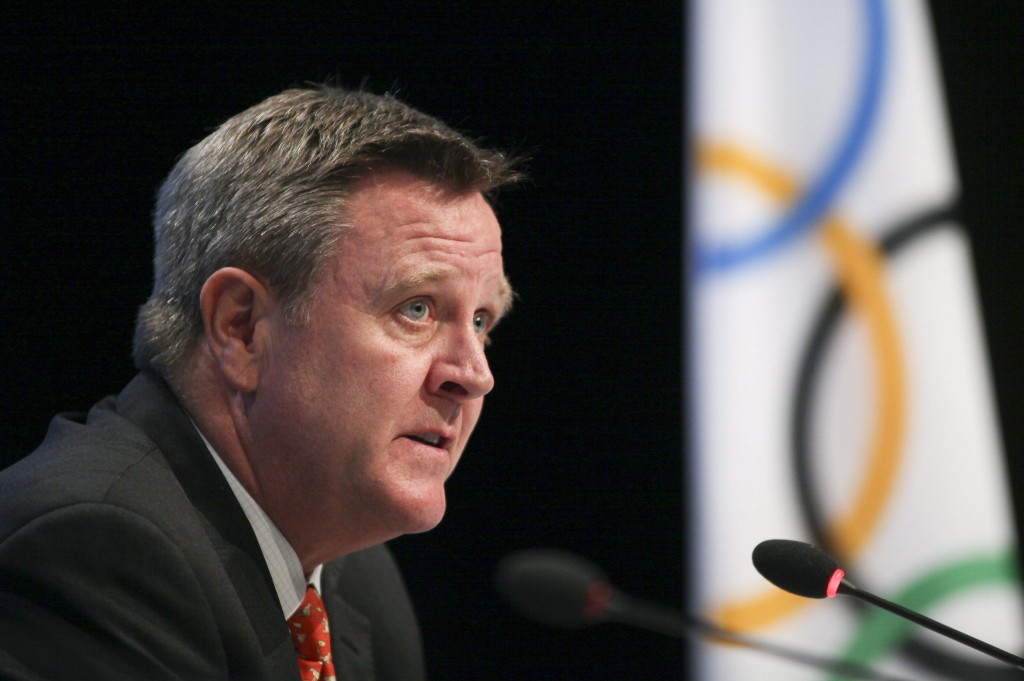
In this May 24, 2012, file photo, Scott Blackmun discusses with the media an agreement between the International Olympic Committee and the U.S. Olympic Committee at the SportAccord conference in Quebec City. AP
COLORADO SPRINGS, Colorado—The leader of the U.S. Olympic Committee compared the choice of Boston as a bidder for the 2024 Olympics to Seattle’s choice to pass the ball at the goal line at the end of the Super Bowl last season.
Fortunately, CEO Scott Blackmun said, “unlike the Seahawks, we have not lost the game.”
In his most candid public comments about the ups and downs of the tumultuous bid process, Blackmun used his speech Thursday at the U.S. Olympic Assembly to focus on the second chance Los Angeles has given the USOC to land the 2024 Games. He also conceded he owed an explanation about the Boston mess to this annual gathering of 400-plus members of the Olympic family.
“The Boston bid failed because, from the beginning, it was not a bid supported by the people of Boston,” Blackmun said. “Should we have taken the risk? In hindsight, the answer is ‘no.'”
READ: Los Angeles back from dead as US candidate for 2024 Olympics
He equated that to the Seahawks’ decision to throw at the goal line in the closing moments of the Super Bowl, while trailing New England by four. That pass was intercepted and the play call has been derided as one of the worst ever made in sports.
“But here’s the thing,” Blackmun said. “Unlike the Seahawks, we have not lost the game. We are back on our feet, we have found a second chance waiting and the whole game is in front of us.”
Indeed, the Olympics won’t be awarded until 2017. Los Angeles is in the race along with Paris; Rome;, Hamburg, Germany; and Budapest, Hungary.
Blackmun introduced LA 2024 chairman Casey Wasserman to the crowd, and Wasserman touted Los Angeles as a storytelling city with 85 percent of its venues already in place, along with a stellar Olympic pedigree as a two-time Olympic host.
Wasserman told his own Olympic story—saying he cut his teeth on the games, back when he was 10 and the 1984 Olympics came to town. Those Games—with Peter Ueberroth calling a lot of the shots while Wasserman’s grandfather, Lew, was a major power player in LA—created the modern-day template for the Olympics and proved they could make money and help a city grow.
READ: Olympics: Budapest, Hamburg, Los Angeles, Paris, Rome, bid for 2024 Games
“In a very real way, our bid is the ‘Back to the Future’ bid of this campaign,” Wasserman said. “And no, ‘Back to the Future’ is not our tagline—but stay tuned.”
Los Angeles offered some news Thursday, announcing Olympic swimming medalist Janet Evans as its vice chair and positioning that move as a strong sign that athletes are at the heart of its plan.
But mostly, these speeches were to get members of the U.S. Olympic movement pumped again after a start to 2015 that Blackmun called “the most unsettling and challenging time in my professional life.”
The USOC picked Boston in January, dumped it in July, then re-upped with Los Angeles earlier this month.
Chairman Larry Probst said the USOC moved forward after the Boston bid tanked because it was encouraged by international colleagues who he portrayed as “surprised and disappointed (but) not discouraged.”
He spent the bulk of his speech giving details about the USOC’s improved international relationships, one sign of which is showing up in a number of world-championship events taking place in the United States.
Those numbers, Probst said, had been “abysmal.” But in 2014, the U.S. hosted eight world championships in Olympic and Paralympic sports, with 10 more this year, including the wrestling world championships in Las Vegas and the triathlon worlds in Chicago, both earlier this month.
All that, plus the fact the U.S. hasn’t hosted the Summer Games since 1996, leads some to call Los Angeles a favorite, or even go so far as to say 2024 is America’s to lose.
While Wasserman read a laundry list of selling points for Los Angeles—a transparent, athlete-centered bid with nearly 90 percent support among residents—he rejected the idea that it’s all over but the voting.
“I think it’s reckless and even arrogant,” he said. “We have to earn this, just like athletes do on the field of play, every day. Nothing is given except that we have to produce a bid that is superior to our competitors.”